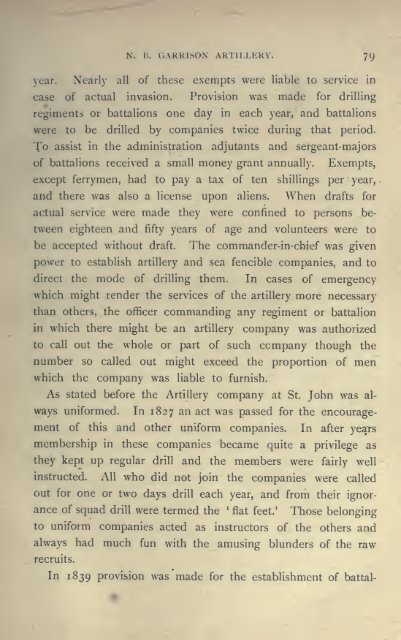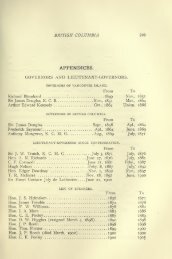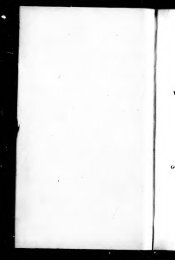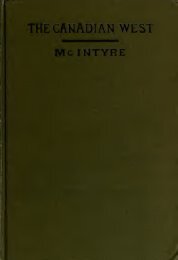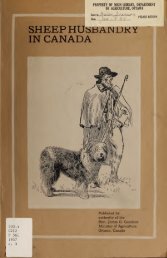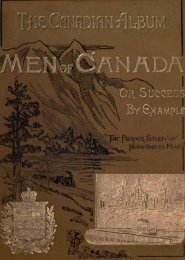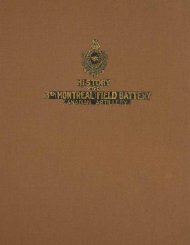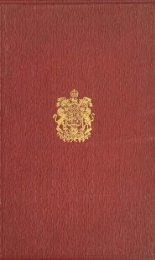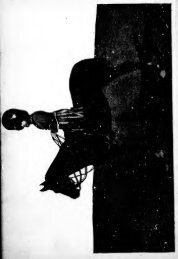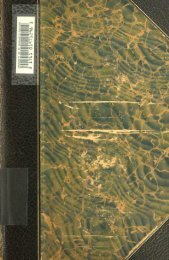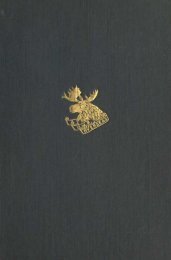- Page 1:
^ :%* > *^ ••^V
- Page 5:
'^^^i^i^
- Page 9 and 10:
(/[.^^^^ J ^^'^^^
- Page 11 and 12:
Jil^TORICALI^JECORD^Q&OF THE1^lEWMB
- Page 13 and 14:
TO /IvIEUTKNANT-COLONEI> DE I.A CHE
- Page 15 and 16:
INDEX TO CORTEKTS.Chapter II1859 -
- Page 18 and 19:
§'§Sf5it
- Page 20 and 21:
2 HISTORICAL RECORDS OF THEconcur.
- Page 22 and 23:
—HISTORICAL RECORDS OF THEthe mil
- Page 24 and 25:
—6 HISTORICAL RECORDS OF THEon th
- Page 26:
—8 HISTORICAL RECORDS OF THEman o
- Page 29 and 30:
(.ARRISONof\. IARTILLERY. 9The * Cr
- Page 31 and 32:
N. B. GARRISON ARTILLERY. IIwharf a
- Page 33 and 34:
3N. B. GARRISON ARTILLERY. 1Daniel
- Page 35 and 36:
N. B. GARRISON ARTILLERY. I5Thomas
- Page 37 and 38:
7N. B. GARRISON ARTILLERY. 1command
- Page 39 and 40:
9N. B. GARRISON ARTILLERY. 1soverei
- Page 41 and 42:
—N. B. GARRISON ARTILLERY. 21- Ex
- Page 43 and 44:
—N. B. GARRISON ARTILLERY. 23The
- Page 45 and 46:
N. B. OARRISON ARTILLERY. 25early a
- Page 47 and 48:
N. B. GARRISON ARTILLERY. 27Alderma
- Page 49 and 50:
N. H. GARRISON ARTILLERY. 29the sum
- Page 51 and 52:
1;N. n. GARRISON ARTILLERY. 3The wa
- Page 53 and 54:
N. B. GARRISON ARTILLERY. 33The sec
- Page 55 and 56: N. B. GARRISON ARTILLERY. 35'priori
- Page 57: Cai'Taix David Waterbury.
- Page 60 and 61: ^8HISTORICAL RFXORDS OF THEpieces m
- Page 62 and 63: 40 HISTORICAL RECORDS OF THErecolle
- Page 64 and 65: 42 HISTORICAL RECORDS OF THEmany ye
- Page 66: 44 HISTORICAL RECORDS OF THElieuten
- Page 69 and 70: N. B. GARRISON ARTILLERY. 45CHAPTER
- Page 71 and 72: N. B. GARRISON ARTILLERY. 47entitle
- Page 73 and 74: —N. B. GARRISON ARTILLERY. 49and
- Page 75 and 76: 1N. v.. GARRISON ARTir,LERV. 5river
- Page 77: Sir John C, Allen.(Chief Justice of
- Page 80 and 81: 54HISTORICAL RECORDS OF THECHAPTERV
- Page 82 and 83: :—56 HISTORICAL RECORDS OF THEany
- Page 84 and 85: —58 HISTORICAL RECORDS OF THEScot
- Page 86 and 87: 6oHISTORICAL RECORDS OF THEStreet,
- Page 88 and 89: 62 HISTORICAL RPXORDS OF THEvigorou
- Page 90 and 91: 64 HISTORICAL RECORDS OF THEkept by
- Page 92 and 93: —66 HISTORICAL RECORDS OF THEmonu
- Page 94 and 95: —68 HISTORICAL RECORDS OF THEtime
- Page 97 and 98: N. B. GARRISON ARTILLERY. 69well su
- Page 99 and 100: —1N. J3. GARRISON ARTILLERY. 7Hug
- Page 101 and 102: N. B. GARRISON ARTILLERY. 73On 5th
- Page 103 and 104: —N. B. GARRISON ARTILLERY. 75was
- Page 105: N. B. GARRISON ARTILLERY. 77The fun
- Page 109 and 110: 1N. B GARRISON ARTILLERY. 8period o
- Page 111 and 112: :N. B. GARRISON ARTILLERY. 83The co
- Page 113 and 114: N. B. GARRISON ARTILLERY. 85Roberts
- Page 115 and 116: N. B. GARRISON*\RTILLERV. 87pany wa
- Page 117 and 118: X. B. GARRISON ARTILLERY.'89which w
- Page 119 and 120: 1X. B. GARRISON ARTILLERY. 9CHAPTER
- Page 121 and 122: N. B. GARRISON ARTILLERY. 93under i
- Page 123 and 124: :—N. 11. C.ARRISON ARTILLERY. 95P
- Page 125 and 126: N. B. GARRISOX ARTILLKRY. 97of the
- Page 127 and 128: N. B. GARRISON ARTILLERY. 99The rep
- Page 129 and 130: N. R. GARRISON ARTILLERY. lOlthe pl
- Page 131 and 132: —X. B. GARRISON ARTILLERY. I03M.
- Page 133: THE COLORS AND TROPHIES OF THE CORP
- Page 136 and 137: Io6HISTORICAL RECORDS OF THF:demand
- Page 138: Io8HISTORICAL RECORDS OF THEof the
- Page 141 and 142: X. B. GARRISON ARTILLERY. I09in the
- Page 143 and 144: N. B. GARRISON ARTILLERY. IllGunner
- Page 145 and 146: :::N. B. GARRISON ARTILLERY. TT39th
- Page 147 and 148: 5N B. GARRISON ARTILLERY. IImajor ;
- Page 149: A. CHAMBERLAIN. G. L. FOSTF.K, J. F
- Page 152 and 153: Il8HISTORICAL RECORDS OF THEsympath
- Page 154 and 155: 120 HISTORICAL RECORDS OF THEsedent
- Page 156 and 157:
122 HISTORICAL RECORDS OF THEunder
- Page 158 and 159:
124 HISTORICAL RECORDS OF THEB. L.
- Page 160 and 161:
126 HISTORICAL RECORDS OF THEThe ne
- Page 162:
128 HISTORICAL RFXORDS OF THEby the
- Page 165 and 166:
N. B. GARRISON ARTILLERY. 129CHAPTE
- Page 167 and 168:
N. B. GARRISON ARTILLERY. I3Icity,
- Page 169 and 170:
N. U. GARRISON ARTILLERY. 1 33Dixon
- Page 171 and 172:
—N. P.. GARRISON ARTILLERY. 1 35A
- Page 173 and 174:
N. 15. GARRISON ARTILLKRY. 1 37The
- Page 175 and 176:
::::N. B. GARRISON ARTILLKRY. 1 39M
- Page 177 and 178:
N. B. GARRISON ARTILLERY. I4ICHAPTE
- Page 179 and 180:
:N. B. GARRISON ARTILLERY. 143and t
- Page 181 and 182:
N. B. GARRISON ARTILLERY. 1 45in th
- Page 183:
Liout. Dell, Major Gillespie, Lieut
- Page 186 and 187:
148 HISTORICAL RECORDS OF THEpublic
- Page 188 and 189:
f^OHISTORICAL RECORDS OF THEand Wal
- Page 190 and 191:
152 HISTORICAL RFXORDS OF THEa dist
- Page 192 and 193:
154 HISTORICAL RECORDS OF THECHAPTE
- Page 194 and 195:
156 HISTORICAL RECORDS OF THEfirst
- Page 196 and 197:
158 HISTORICAL RECORDS OF THELieute
- Page 198 and 199:
l6oHISTORICAL RECORDS OF THEservice
- Page 200 and 201:
1 62 HISTORICAL RECORDS OF THEeral
- Page 202 and 203:
164 HISTORICAL RFXORDS OF THEthe co
- Page 204 and 205:
1 66 HISTORICAL RECORDS OF THEprepa
- Page 206:
1 68 HISTORICAL RECORDS OF THEprese
- Page 209 and 210:
N B. GARRISON ARTILLERY. 169CHAPTER
- Page 211 and 212:
N. 15. GARRISON ARTILLERY. I7Iearne
- Page 213 and 214:
—N. B. GARRISON ARTILLERY. 1 73No
- Page 216 and 217:
Major A. J. ARMSXRoxr.
- Page 218:
—1^6HISTORICAL RECORDS OF THEbeau
- Page 221 and 222:
N. B. GARRISON ARTILLERY. 1 77Resol
- Page 223 and 224:
N. B. GARKISOK ARTILLKKY. 1 79nor w
- Page 225 and 226:
N n. GARRISON ARTILLERY. l8lJohn th
- Page 229 and 230:
N. B. GARRISON ARTILLERY. 183in the
- Page 231 and 232:
N. P.. GARRISON ARTILLERY. 185new m
- Page 233 and 234:
N. B. GARRISON ARTILLERY. 187he is
- Page 236 and 237:
Sergeant-Major Hughes.
- Page 238 and 239:
90 HISTORICAL RECORDS OF THEportion
- Page 240 and 241:
—192 HISTORICAL RECORDS OF THEThe
- Page 243 and 244:
N. B. GARRISON ARTILLERY. 1 93not g
- Page 245 and 246:
N. P.. GARRISON ARTILLERY. 1 95was
- Page 247 and 248:
'N. B. GARRISON ARTILLERY. 1 97CHAP
- Page 249 and 250:
'N. B. GARRISON ARTILLERY. 1 99the
- Page 251 and 252:
N B GARRISON ARTILLERV. 20Ia consid
- Page 253 and 254:
—;N. B. GARRISON ARTILLERY. 203sh
- Page 255:
Martello Tower.
- Page 258 and 259:
2o6HISTORICAL RECORDS OF THEBarrack
- Page 260 and 261:
"2o8HISTORICAL RECORDS OF THEAdjuta
- Page 262 and 263:
;2IOHISTORICAL RECORDS OF THE**the
- Page 264 and 265:
212 HISTORICAL RECORDS OF THEgrand
- Page 266 and 267:
—214 HISTORICAL RECORDS OF THEby
- Page 268 and 269:
2l6HISTORICAL RECORDS OF THEservice
- Page 270:
2l8HISTORICAL RECORDS OF THEreturn
- Page 273 and 274:
N. B. GARRISON ARTILLERY. 219have b
- Page 275:
,that—:N. B. GARRISON ARTILLERY.
- Page 279 and 280:
:—CENTENNIALBATTERY R0LL8-1893.No
- Page 281 and 282:
:CENTENNIAL ROLLS.Gunners—James E
- Page 283 and 284:
FIELD AND STAFF OFFICERS.229ST-A.ZF
- Page 285 and 286:
IJ,FIELD AND STAFF OFFICERS.231ST.i
- Page 287 and 288:
ST-A-IFF OIFIFICBms Continued.FIELD
- Page 289 and 290:
OFFICERSSERVICE LISTS.235THE COLVIL
- Page 291 and 292:
: RobertOFFICERS SERVICE LISTS.CAPT
- Page 293 and 294:
1//,OFFICERS SERVICE LISTS.239No. I
- Page 295 and 296:
officers' service lists. 241No. 2(C
- Page 297 and 298:
Lieutenant.Secondofficers' service
- Page 299 and 300:
,r.j!vice{prov.)Ii{prov.)j'OFFICERS
- Page 301 and 302:
OFFICERS SERVICE LISTS.WESTMORELAND
- Page 303 and 304:
officers' service lists.GAGETOWN, Q
- Page 305 and 306:
OFFICERSSERVICE LISTS.251No, 6 BATT
- Page 307 and 308:
INDEX.Aberdeen, Earl and Countess o
- Page 309 and 310:
'GraveyardINDEX. 255' 'Eastern batt
- Page 311 and 312:
INDEX. 57Milliken, Benjamin, lieute
- Page 313:
INDEX 259Thompson, Geo. F., recolle


